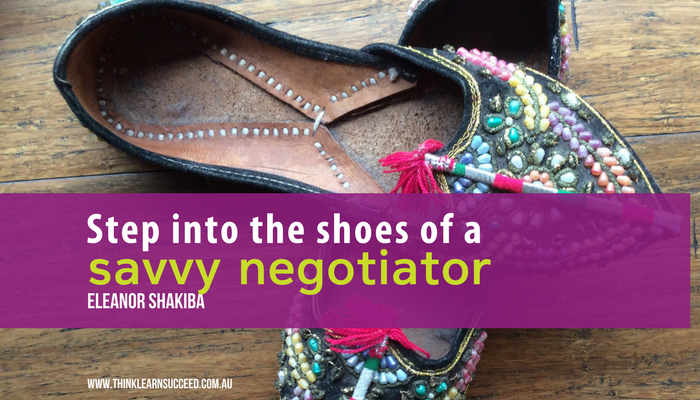 Do you think of negotiation as a stress-inducing activity, or do you see it as fun? If you answered fun, you’re operating from the same mindset as a savvy negotiator. Savvy negotiators take pleasure in the art of communicating with their counterparts. They enjoy the to-and-fro of concession exchange. They’re also playful and creative in both their thinking and communication patterns. They enter what positive psychologists call a flow state. Being in this state vastly increases their negotiation effectiveness.
Do you think of negotiation as a stress-inducing activity, or do you see it as fun? If you answered fun, you’re operating from the same mindset as a savvy negotiator. Savvy negotiators take pleasure in the art of communicating with their counterparts. They enjoy the to-and-fro of concession exchange. They’re also playful and creative in both their thinking and communication patterns. They enter what positive psychologists call a flow state. Being in this state vastly increases their negotiation effectiveness.
So, what exactly is a flow state and how can YOU access it? It’s the state of mind you achieve naturally when you’re doing something you love. It’s being in the zone. Psychologists define flow as a state in which you’re fully immersed in an activity. Your attention is focused purely on that activity and you feel pleasure and involvement.
Sounds nice, doesn’t it? Imagine what it would be like to negotiate from this state, rather than feeling nervous or anxious. What would be different? How would you and your counterpart benefit from your relaxed mode of operating? The research suggests your creativity would be heightened. Both parties would enjoy the conversation and take pleasure in being together. Time would slow down, but you’d seem to get more done.
If you think these results are worth experiencing, it’s time to learn how to go with the flow during negotiations. So what can you learn from Positive Psychology about achieving a state of flow? More importantly, how can you move into a flow state the next time you negotiate? Here are some success tips to get you started.
Free course preview.

SIGN UP FOR YOUR SNEAK PEEK PROGRAM NOW.
Flow tip 1. Aim to be creative. Approach problems as opportunities to design new solutions. Meet your counterpart in an inviting environment. Surround yourselves with lots of paper, colourful pens, white boards and creative thinking tools. Invite your counterpart to explore and create before locking down to any one course of action or closing a deal. Most importantly, set a ‘no commitment’ frame. Remember that generating ideas is a separate process to finally selecting the ideas you’ll put into action. Make the ideation stage fun. Do this by refusing to get bogged down in nitty-gritty details. During the creative stage, simply come up with ideas, no matter how wacky.
Flow tip 2. Manage your mindset. Actively apply positive thinking techniques. Highly successful negotiators take pleasure in the negotiation process. They approach every negotiation as a creative enterprise. They revel in the experience of building a deeper relationship with their counterparts. Most importantly, they do not view negotiations as a struggle or battle.
Before you begin negotiating, check what you’re thinking. Are you seeing this as a situation in which one person is going to win and the other be defeated? Or are you genuinely looking for ways to deepen your relationship with your counterpart? Aim to build a deep rapport, because this makes the conversation more satisfying for everyone.
Flow tip 3. Remember that flow occurs when you’re applying skills you’ve already mastered. You won’t go into flow if you’re struggling to with the basics of negotiation. Actively develop your negotiation skills outside negotiation contexts. In particular, focus on mastering collaborative language patterns. Enrol in a course where you’ll get to experiment with these.
Flow tip 4. Give yourself ample time. Let yourself relax and enjoy the negotiation. Imagine you’re a rug-dealer in an Egyptian market – you want to spend time chatting and socialising, not just getting a deal. The flow state is characterised by time distortion. You feel as if you have all the time in the world to focus. You won’t feel this way if you’re stressed by deadlines.
Flow tip 5. Manage your time. Say ‘no’ to people who try pushing you into immediate action. Factor buffer time into your negotiations, so you won’t be stressed by breaks or pauses in the conversation. This one step can drastically transform how you feel about negotiating. It allows you to relax into the conversation rather than feeling pressured and tense.
And remember that the flow state occurs naturally. Don’t strive to achieve flow. You really do need to go with it!
About the author of these tips
Eleanor Shakiba is a specialist in positive psychology. Her key area of expertise is helping smart professionals build their social and emotional intelligence. Since 1994, Eleanor has been teaching talented people – like you- how to think, communicate and behave in ways that build success. Eleanor is qualified in Social Anthropology, Applied Psychology, Adult Education and Neuro Linguistic Programming.